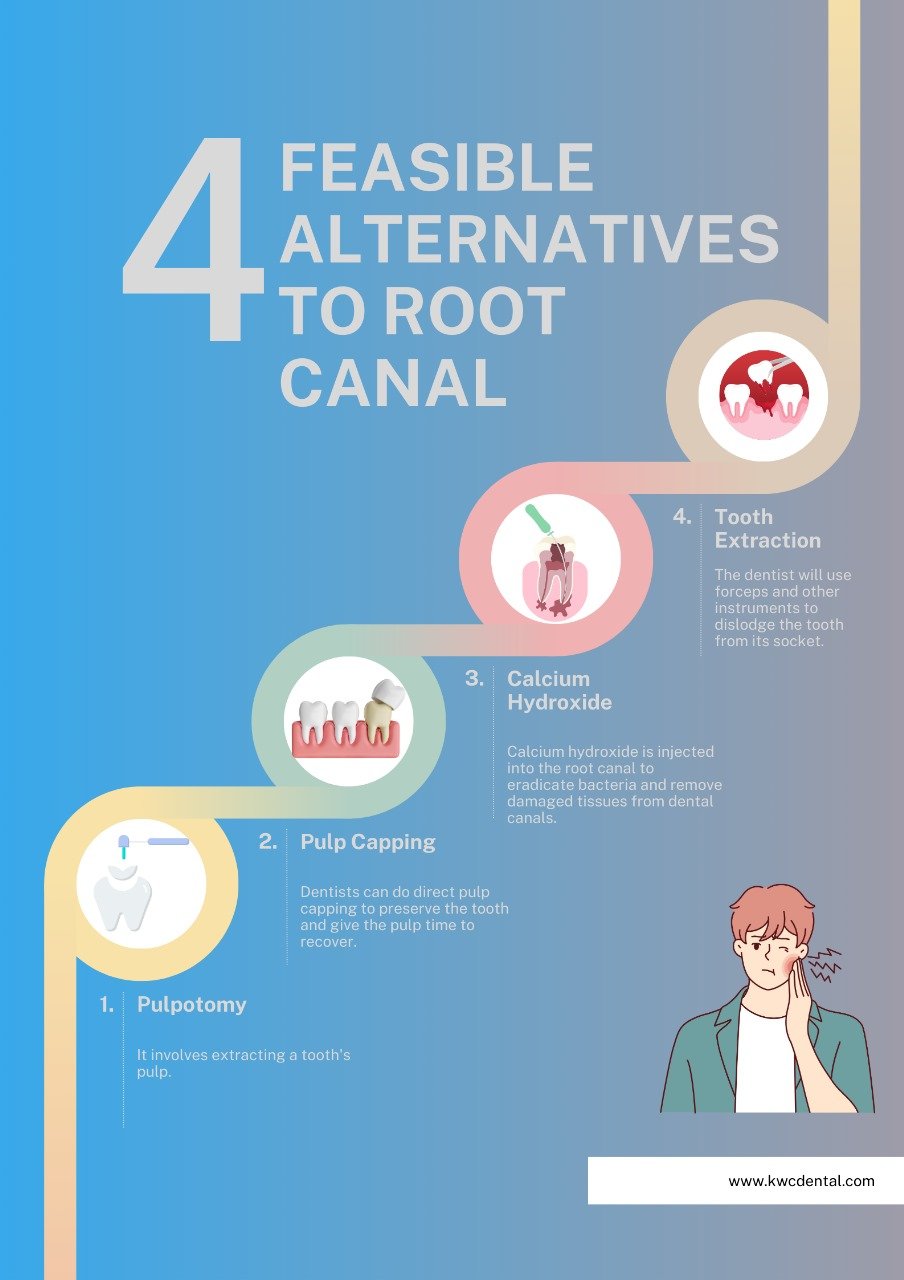4 Root Canal Alternatives To Curb Your Root Canal Phobia
Deceased nerves and a diagnosed oral infection are drastic times that call for drastic measures.
To alleviate the pain and maintain the tooth structure may require a root canal procedure.
Due to the risks and side effects of root canals, people often look for root canal alternatives.
That's why this brief guide has modern alternatives to root canal procedures that are safe and effective.
Related Blog: 8 Easy-to-Follow Tips on How to Avoid Root Canal
4 Feasible Alternatives to Root Canal
When the nerve inside the tooth is severely damaged to the point that recovery is impossible, leaving it untreated in your mouth won't be a good idea.
If a root canal gives you dread or anxiety, you can go with one of the following alternatives to root canal treatments:
1.Pulpotomy
This process from the root canal alternatives involves extracting a tooth's pulp.
When there is severe damage to the pulp, the dentist may recommend it.
During a pulpotomy, the pulp is removed, and inert material is inserted within the tooth to promote quicker healing and guard against bacterial infection.
Subsequently, the dentist will fill the tooth's interior and use a crown to restore and shield it from any type of damage in the future.
This is one of the most common root canal alternatives in adults and toddlers.
2.Pulp Capping
Pulp capping gives a patient two root canal alternatives–direct and indirect.
The professionals consider it when there is mechanical damage to the primary teeth.
Direct Pulp Capping
Dentists carry out this process from the other root canal alternatives in an effort to protect the tooth and prevent the need for a root canal.
They can do direct pulp capping to preserve the tooth and give the pulp time to recover.
It is only effective if the pulp remains unaffected by the infection.
A root canal might still be necessary if an infection develops in the pulp.
Indirect Pulp Capping
This is from the types of root canal alternatives that preserve the tooth and its vitality.
The dentist uses a protective liner to treat the cavities and shield the dentin.
In addition, the procedure doesn't expose the pulp of the tooth.
3.Calcium Hydroxide
Using this one from the root canal alternatives, Calcium Hydroxide penetrates the root cavity.
Calcium hydroxide is injected into the root canal to eradicate bacteria and remove damaged tissues from dental canals.
In the canals, these gasses prevent the growth of microorganisms.
Many professionals may not prescribe it because it can be toxic if not used properly.
4.Tooth Extraction
To save the dying tooth, extraction is sometimes necessary as one of the root canal alternatives.
To make it easier to extract the afflicted tooth, the dentist will use forceps and other instruments to dislodge the tooth from its socket.
On the other hand, an oral surgeon will do the job in complicated situations.
If there is a large tooth, the endodontist may break it completely or require incisions and stitches for the extraction.
Learn more: Tooth Extraction Vs. Root Canal: Exploring Treatment Options
FAQs
What are some complications of a root canal procedure?
If the tooth that undergoes a root canal doesn't heal properly, it can cause pain or cause an infection.
How does the endodontist replace the infected tooth after extraction?
For tooth replacement, the endodontist uses dental implants, crowns, bridges, or removable partial dentures.
In Conclusion
With the evolution of technology, the success rate of a root canal is high. Also, the discomfort you may experience during the procedure will be equivalent to a conventional dental filling.
Yet, if you want an alternative to a root canal, your options are indirect and direct pulp capping, pulpotomy, Calcium Hydroxide, and tooth extraction.
Depending on your oral condition, an expert will explain whether you need a root canal or the root canal alternatives.
To ensure that your oral health requirements are met with your preferred choices, book an appointment with us.


